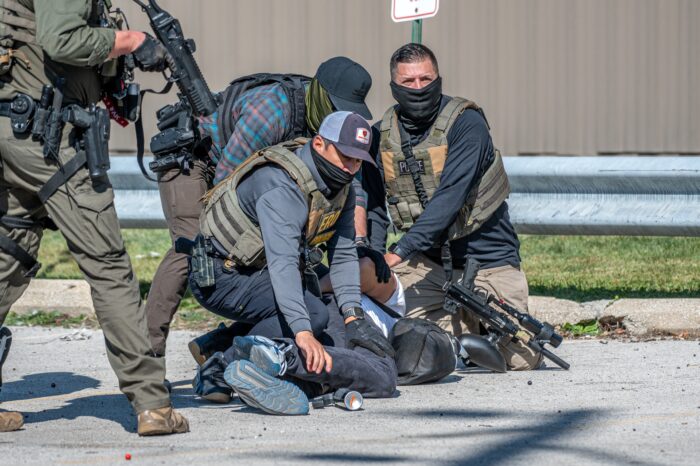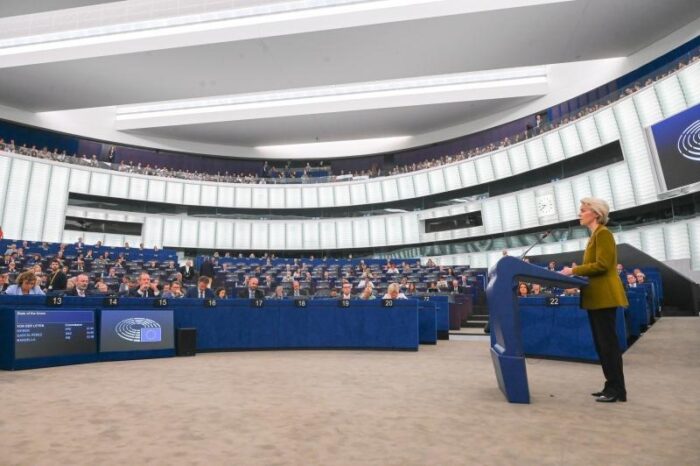The Progressive Post
Serbia’s students roar, the EU still whispers: time to speak up

Over 100 days into Serbia’s student-led protests, a call for the rule of law has grown into a roaring challenge against President Aleksandar Vučić’s governance model. The EU must stop whispering, and speak – clearly, urgently and truthfully.
What began as mourning after the deadly collapse of the Novi Sad railway station canopy has become the largest protest movement since the fall of former president Slobodan Milošević in 2000. Students are demanding accountability, transparency and the rule of law. These protests now force the EU to choose: stay cautious or confront Serbia’s dangerous drift.
The movement stands out for its independence. It was not initiated by political parties, civil society groups or foreign actors. Quite the opposite – the students have deliberately distanced themselves from all of them. There is no central leadership, no prominent figurehead and no media-savvy spokesperson. Their demands are clear: transparency over the Novi Sad station’s reconstruction, withdrawal of charges against protesters, prosecution of attacks on students and professors and a 20 per cent increase in higher education funding. They are not calling for Vučić’s resignation – but their demands challenge his rule’s foundations: impunity and opacity.
At first, Vučić ignored the protests. Then he mocked them. When that failed, he pretended to respond to the students’ demands. But behind this facade, another narrative was implemented: government-aligned media targeted student activists, civil society organisations, foreign-funded initiatives and even EU citizens in Serbia – reviving the narrative of foreign plots and external enemies. Soon, the rhetoric turned into action. In January, student leaders were assaulted in Novi Sad by men reportedly linked to the ruling party. In February, police raided prominent civil society groups like the Center for Research, Transparency and Accountability (CRTA), accusing them of financial misconduct. The pattern was clear: from ridicule to repression.
Vučić, once a master of public messaging, now looked disconnected. The resignation of prime minister Miloš Vučević after the Novi Sad violence in January did not quell public anger. Protests intensified. Aware that this political move was not sufficient, Vučić delayed parliament’s decision to accept the resignation for an extraordinary 50 days. He now faces a deadline to form a new government by 18 April or call elections by mid-June. Given the risk of opposition boycotts and no real electoral reform, he will likely manage to form a new cabinet.
Meanwhile, the EU has clung to quiet optimism. At first, it ignored the protests, betting on renewed momentum in the accession process. Serbia’s participation in the EU Growth Plan – potentially unlocking €1.6 billion – seemed like progress. There was hope that new accession chapters could open. Brussels sensed an opportunity to regain influence after years of stagnation. Since 2018, when member states declined to set 2025 as Serbia’s EU entry date, Belgrade has played its cards skilfully. It deepened ties with China and Russia, as well as individuals close to US President Donald Trump’s inner circle, while the EU watched from the sidelines. Now, it risks making the same mistake again.
As the protests grew, the EU did respond, but only faintly. There were general calls for dialogue and defence of civil society, but no clear criticism of Vučić’s tactics. No pressure. No proposals. Instead, the EU shifted attention to other enlargement frontrunners like Montenegro and Albania – promising to finalise accession talks with them until 2027, signals that even Vučić’s inner circle does not take seriously.
His meeting on 19 March with EU enlargement commissioner Marta Kos and on 25 March with the president of the European Commission, Ursula von der Leyen, illustrate the EU’s faltering stance. After both meetings, Vučić claimed Serbia would soon join the Single Euro Payments Area (SEPA), highlighting benefits for remittances and businesses. He also spoke of plans to open not one, but several negotiating clusters on enlargement this year. On reforms, Vučić was vague. He acknowledged the EU’s expectations – media laws, changes to the regulatory authority for electronic media (REM), and updates to the electoral register – but gave no firm commitments. Instead, he offered more optimistic talking points: Serbia could ‘reignite the European process’.
Kos was more measured. She reiterated that enlargement demands Serbia’s clear strategic alignment and said that civil society and media are essential. Six days later, Von der Leyen was bit more direct. She stressed that Serbia “needs to deliver on EU reforms”, citing the need for “decisive steps” on media freedom, the fight against corruption and the electoral reform. Their social media posts triggered strong online reactions. Commenters urged Kos to ensure the EU acknowledges the protests and “showcase the same commitment to this principle [of the rule of law]”. Von der Leyen was reminded that Serbia has been “regressing in all key EU accession criteria” for some time.
The irony? The EU has already documented Serbia’s decline. Its latest Commission report, published just two days before the Novi Sad tragedy, warned of political pressure on judges, flawed hiring practices and police violence. It flagged media capture, misuse of public resources and harassment of public employees – all grievances behind the protests. Notably, the report dropped previous language suggesting Serbia was balancing rule-of-law reforms with progress. But the message was buried in dry prose. It is time to say it plainly: Serbia’s democracy is backsliding, its rule of law falls short of EU standards, and many current policies are incompatible with EU membership. This message must reach Vučić, the opposition and Serbia’s citizens.
Brussels also faces a larger reckoning. Without stronger support from member states, the European Commission’s offer to finalise accession talks with several candidates by 2030 will fail. Member states must match this ambition. At the June European Council meeting, they should commit to reforming EU institutions, policies and budgets for future enlargement. They should also guarantee that candidates meeting EU and rule of law standards gain full access to the single market before accession. This would restore the EU’s credibility and show that it is ready to reward serious reform.
The status quo in Serbia has cracked. Earlier this week, Ana Brnabić, speaker of the parliament and Vučić’s closest ally, described the protestors as a “fascist falange” – militia formations active in the first half of the twentieth century – warning that “fascism is rolling through the streets of Serbia”. She claimed that behind the protests are political organisations which are “borderline terrorist organisations”. Brnabić noted that so far, Serbia’s law enforcement agencies had tried to act against these groups very carefully and cautiously, but warned that, to protect law and order, this might soon no longer be possible. The message is clear: the illegal use of ‘sound cannons’ against protesters on 15 March might be remembered as a troubling preview of what could follow so that the authorities retain control. What really follows depends on who dares to speak – publicly, clearly and in solidarity with those demanding justice. If the EU continues to whisper, Serbia risks sliding further into authoritarianism. Worse, it could destabilise the region and erode what remains of the EU’s standing. History will remember whether the EU chose to whisper or to speak up and act.
Photo credits: Shutterstock/Marko Dimic




